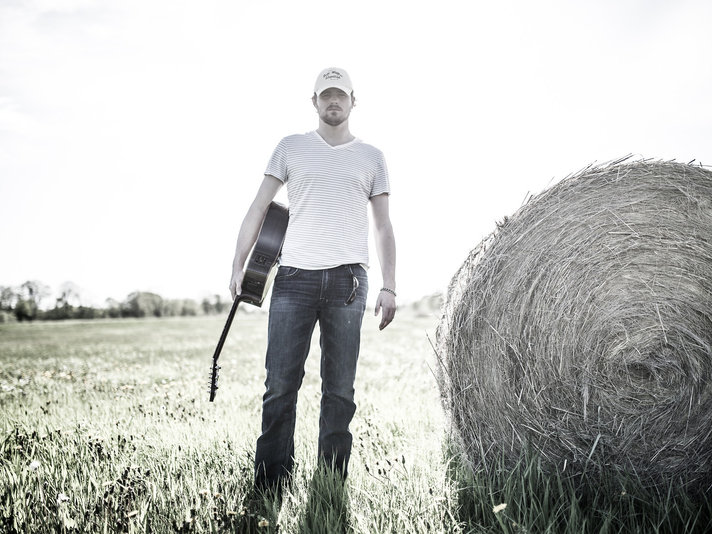Jay Matthes’ career in music started with second place and a far too conveniently named rival talent show band.
It was the Sussex Hamilton High School talent show over a decade ago, and Matthes had gathered together a friend and a drummer to form a band because "we just wanted to win stuff." The trio ended up snagging the silver medal, with a band called TANC coming away the winner. TANC, as Matthes recalls, was an acronym for either Tomorrow’s A New Chance or Today’s A New Chance.
Either way, as it turns out, tomorrow did bring a new chance for Matthes. Long since those early talent show days, the Milwaukee-based Americana musician has dug himself out a nice place in the Milwaukee music scene, beginning with some time with the rock band A Common Engine before heading off to perform covers and now write originals on his own. Last month, he released a 10-track album of originals called "A Drier Place" as well as received nominations from the Shepherd Express as Best Acoustic Musician and Best Male Vocalist.
In the midst of all of this excitement, OnMilwaukee.com got a chance to chat with Matthes about his musical inspirations – including rap duo Run The Jewels – the value of covers and original music, and being in a better place today.
OnMilwaukee.com: Who were your main inspiration for your sound on this album? You mention The Head and the Heart and Zac Brown Band in your bio.
Jay Matthes: I love listening to all kinds of music. Just now, I was listening to Sam Hunt and then Run The Jewels. The biggest influence I’d probably say was Zac Brown, just because his style of music. He’s never afraid to try new things, as far as his work with Dave Grohl, and Trombone Shorty was on "Uncaged." Lots of different sounds. If you go to one of his live shows, he does lots of different covers from Stevie Wonder to John Mayer to Metallica to Charlie Daniels. I relate to having those kind of influences.
OMC: Now I want to know how Run The Jewels influenced your music.
JM: You know, my last CD was called "Apartment 201," and I recorded it by myself in an old childhood bedroom. There was a hidden song on there that was a rap song. My brother did the beat, and I rapped for like three and a half, four minutes. That was back in 2011, but like I said, there’s always an influence. Every now and again, one of those pops out in just a crazy way.
OMC: What is it about the Americana genre of music that really speaks to you?
JM: It’s just the kind of music that comes out. Going back to the album that I was talking about in 2011, when I played those songs live, a lot of those songs didn’t translate live because I recorded them with a bunch of different stuff and different instruments and different people. I guess the only thing that I wanted was a strong acoustic backbone so that I could go and play these songs out and they wouldn’t lose anything live.
All the songs are acoustic driven for that purpose, but past that, as far as style, that’s just the most natural style for me. I was in a band called The Common Engine that was an original band from about 2011 until about 2013, and that was rock. That was pretty hard rock. I kind of dabbled in different things, and this is just … I’m 30 years old now, I’ve been playing music for a while now and this just felt more natural and the harmonies came out and the strong acoustic guitar came out. It just what was natural.
OMC: Now, this new album is all originals?
JM: All new, all originals, yep. No pitch correction, no beats, no loops, no programmed instruments. What you hear is what we recorded, with very minimal correction on the producer’s side. We had a lot of fun recording it. A lot of times, I’d write a song, and a week later, I’d go down in the basement and we’d record it. It was a very fluid process and very fun process.
OMC: Was it difficult coming from a mostly covers artist to writing an album of original music?
JM: No, never a tough transition. I think it actually helps because it keeps things new and interesting. I’m not just writing originals, and I’m not just going out and playing covers. Things like that keep things new. I’ve been playing professionally for about three and a half years now, and I look forward to every show. I have fun at every show. Music itself is just very natural, and whether it’s cover music or original music, whether you’re playing at Club Garibaldi’s or playing for a thousand people in a beer tent at a festival, it’s a part of my life that’s natural. Whatever way I can make a connection with the audience – be it through one of their favorite songs they grew up with or with their favorite song off the new album – it’s always fun to make that connection.
OMC: How did the "A Drier Place" come together?
JM: I started consciously writing this album about two years ago. Common Engine had just broken up, and that wasn’t the smoothest thing ever. My personal life was all over the place. I starting writing this middle finger of an album, and when I started playing these new songs to people and myself, I sounded like a bitter person. It wasn’t how I wanted to come across. I didn’t want to come across as a jaded person; I didn’t want to be a jaded person.
So I started changing things in my life. That led to a lot of things. It led to a new relationship with somebody I’m still dating today, but it also led to a change in songwriting. They’re not all happy songs, but none of them are angry. There’s a positive feel or optimism or silver lining or tongue-in-cheek, and that was a conscious thing, writing from that place. I scrapped all the negative songs; I just threw those out. I didn’t want to be that musician; I didn’t want to be that person. I wrote from a different place, and I wrote until about June or July.
The last song I wrote was called "A Drier Place," and just every line in that song is about the last two years of my life really. So that was what we named the CD, and every song comes from that drier place, a more positive place of looking at things in a different light and being in a better place today than I was yesterday.
As much as it is a gigantic cliché to say that one has always had a passion for film, Matt Mueller has always had a passion for film. Whether it was bringing in the latest movie reviews for his first grade show-and-tell or writing film reviews for the St. Norbert College Times as a high school student, Matt is way too obsessed with movies for his own good.
When he's not writing about the latest blockbuster or talking much too glowingly about "Piranha 3D," Matt can probably be found watching literally any sport (minus cricket) or working at - get this - a local movie theater. Or watching a movie. Yeah, he's probably watching a movie.







